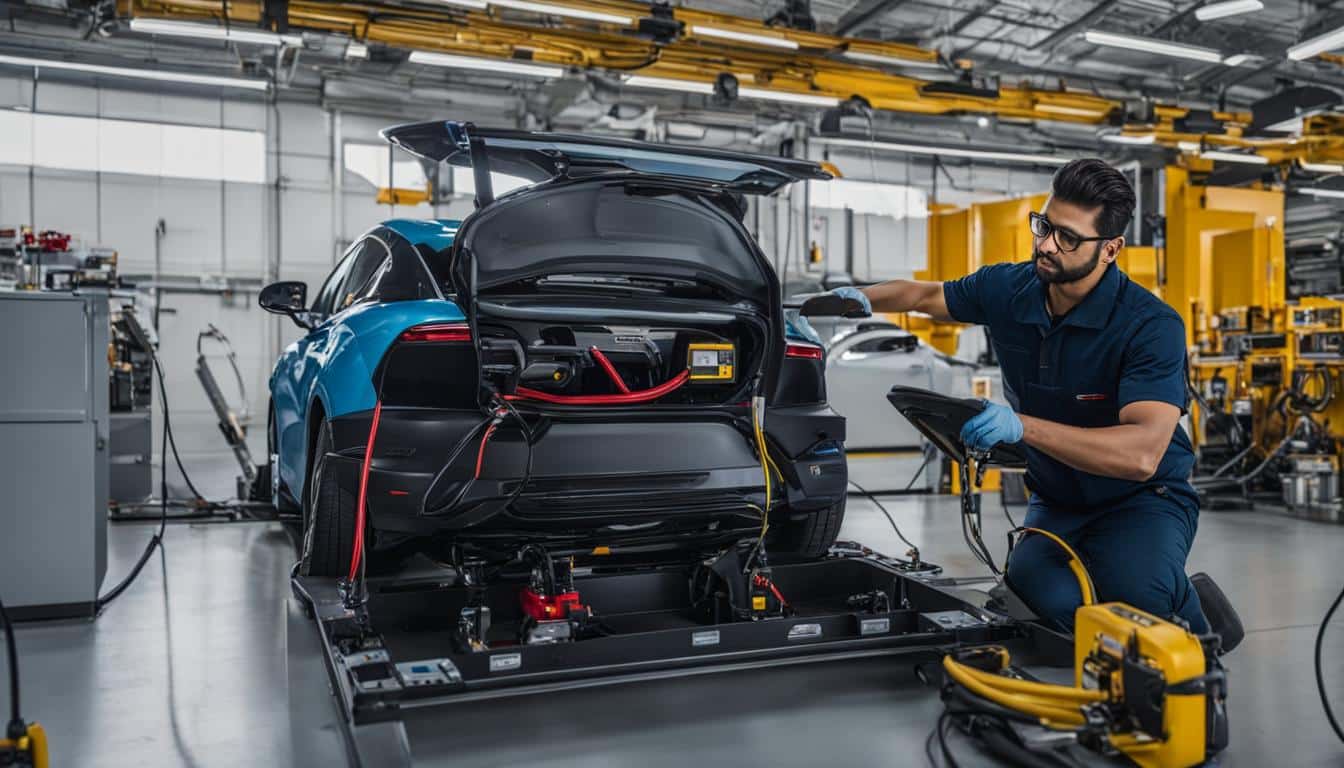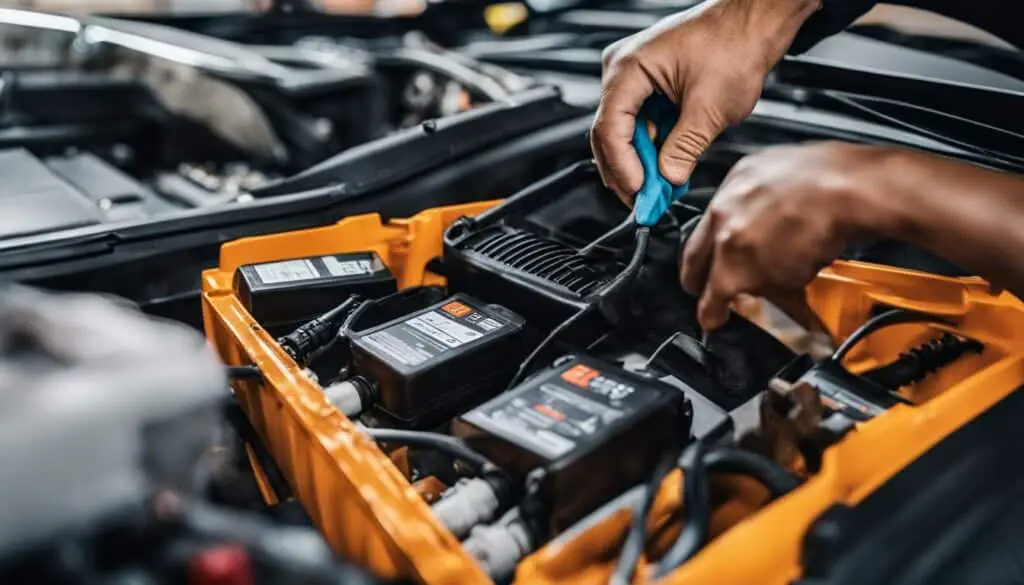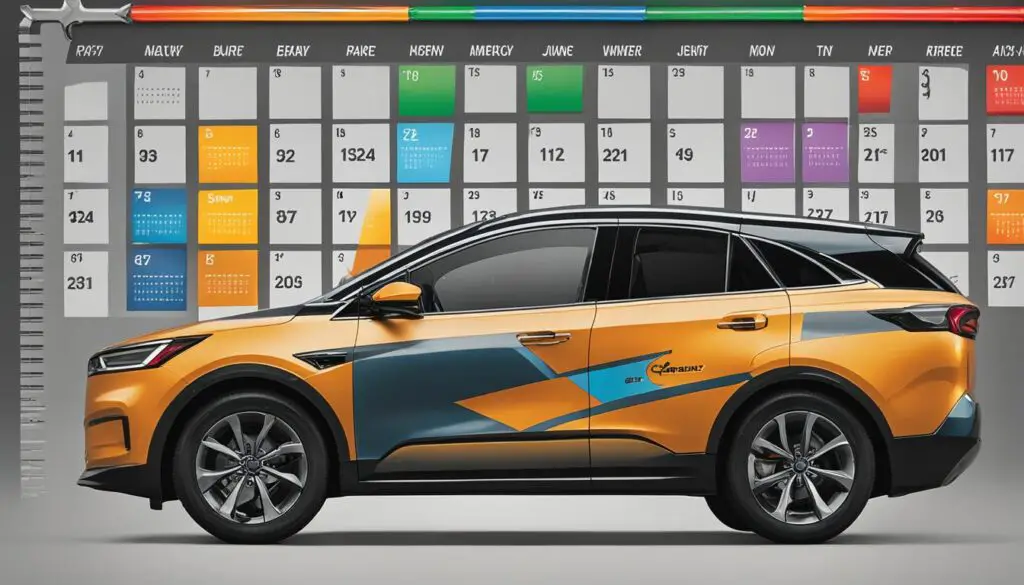
Preventive Maintenance Strategies for EV Batteries
Just like regular internal combustion engine (ICE) cars, electric vehicles (EVs) also require preventative maintenance to continue running their best. EV preventative maintenance includes routine steps such as checking tire pressure, inspecting and replacing filters, and updating firmware and software. In addition, EV owners should regularly charge their batteries to avoid fully discharging it and only charge it up to 80% of its maximum. EV preventative maintenance should be followed according to the manufacturer’s recommended schedule.
Key Takeaways:
- Regular preventative maintenance is crucial for the smooth operation of EVs.
- Key maintenance tasks include checking tire pressure, inspecting and replacing filters, and updating firmware and software.
- Regular charging of the battery and keeping it between 20% and 80% capacity helps maintain battery life.
- Follow the manufacturer’s recommended maintenance schedule for optimal results.
- Proper maintenance can help avoid costly repairs and ensure a reliable driving experience.
What Is EV Preventative Maintenance?
EV preventative maintenance plays a vital role in ensuring the optimal performance and longevity of electric vehicles (EVs). By implementing routine care measures, EV owners can prevent costly auto repairs, avoid breakdowns, and prioritize passenger safety.
One of the fundamental aspects of EV preventative maintenance is regularly checking and maintaining tire pressure, which involves inspecting tires for wear and tear. Well-balanced and properly inflated tires contribute to increased energy efficiency and longer driving times between charges.
Additionally, EV preventative maintenance includes inspecting and replacing filters as needed to maintain the cleanliness of the vehicle’s systems. This helps prevent contaminants from causing damage to critical components.
An essential aspect of EV preventative maintenance revolves around keeping firmware and software updated. By ensuring these systems are up-to-date, EV owners can access the latest features and enhancements, enhancing their overall driving experience. Regular updates also address any potential software vulnerabilities, bolstering cybersecurity measures.
Well-balanced tires and updated firmware and software are integral to EV preventative maintenance. These routine care measures not only prevent costly repairs but also provide a safer and more enjoyable driving experience.
Important Elements of EV Preventative Maintenance
In addition to standard preventative maintenance procedures like checking tire pressure and replacing filters, there are a few other important elements involved in maintaining an electric car. EV software updates and regular charging play a significant role in maximizing the performance and longevity of your electric vehicle.
EV software updates are crucial for keeping your car up to date with the latest features and enhancements. These updates can be done remotely through OTA (over the air) updates, saving you time and ensuring that your car’s software is optimized for improved performance and functionality.
“EV software updates are like installing software updates on your smartphone. They enhance your car’s performance, fix any bugs or glitches, and provide access to new features and improvements.”
Another critical element of EV preventative maintenance is regular charging. It is essential to avoid letting the battery discharge completely and to only charge it up to 80% of its maximum capacity. By following this charging practice, you can prevent battery life reduction and range anxiety, ensuring that your EV’s battery stays healthy and performs optimally over time.

By prioritizing EV software updates and regular charging, you can ensure that your electric car remains in top condition, providing reliable and efficient transportation for years to come.
Electric Car Maintenance Timeline
Following a proper EV maintenance schedule is crucial for preserving the performance and longevity of your electric vehicle. By adhering to your manufacturer’s recommended timeline for preventative maintenance, you can ensure that your EV remains in optimal condition. Regular maintenance tasks should be performed on a monthly, six-monthly, and yearly basis to address different aspects of your EV’s overall health.
Monthly Maintenance Tasks
On a monthly basis, it is important to perform specific maintenance tasks to keep your EV running smoothly. These tasks include:
- Checking tire pressure: Maintaining the correct tire pressure is vital for safety and optimal performance. Under-inflated or over-inflated tires can affect handling, fuel efficiency, and tire wear. Use a tire pressure gauge to regularly check and adjust the pressure according to the manufacturer’s specifications.
- Inspecting tires for wear and tear: Regularly examine your tires for signs of uneven wear, bulges, or cuts. Damaged tires should be replaced promptly to ensure safe and efficient driving.
- Topping off windshield wiper fluid: Clear visibility is essential for safe driving. Keep your windshield wiper reservoir filled with windshield wiper fluid to ensure your wipers can clean the windshield effectively.
- Checking windshield wiper blades: Inspect the condition of your windshield wiper blades and ensure they are in good working order. Worn or damaged blades should be replaced to maintain optimal visibility during rainy or snowy conditions.
Six-Monthly to Yearly Maintenance Tasks
Every six months to a year, it is recommended to bring your EV in for a comprehensive inspection. This full inspection may include:
- Rotating tires: Rotating your tires helps promote even wear and prolong their lifespan. Follow the recommended rotation pattern specified by your EV manufacturer.
- Checking coolant levels: Proper coolant levels are crucial for managing the temperature of your EV’s components. Inspect the coolant levels and top off if necessary.
- Inspecting components for wear and tear, leaks, or damage: A thorough examination of various components, such as the battery, electrical system, brakes, and suspension, helps identify potential issues and prevent costly repairs.

By following this maintenance timeline, you can proactively address any issues and ensure the longevity and performance of your electric vehicle. Regular maintenance will help you enjoy a reliable and satisfying driving experience while avoiding expensive repairs down the road.
The Importance of Regular Maintenance for EV Batteries
Regular maintenance for EV batteries is crucial to maintain the performance, efficiency, and longevity of electric vehicles. By performing routine maintenance tasks, EV owners can prevent common issues such as uneven tire wear, reduced braking efficiency, and battery failure, ultimately avoiding costly repairs.
Battery Maintenance
Keeping the EV battery in optimal condition is essential for uninterrupted power supply and smooth operation. Regularly inspecting the battery for signs of damage or leaks is important to prevent any potential issues. Additionally, monitoring the battery’s state of charge and ensuring it’s within the recommended range helps maintain its overall performance.
Tire Maintenance
Proper tire maintenance is vital for safety and longevity. EV owners should regularly check the tire pressure and ensure it matches the manufacturer’s recommended levels. Well-balanced tires result in improved energy efficiency, longer driving times between charges, and reduced wear and tear on the tires.
Brake Maintenance
Regular brake maintenance not only ensures safe driving but also helps preserve the overall performance of an electric vehicle. EV owners should inspect the brake pads and rotors regularly and replace them when necessary. Properly functioning brakes contribute to efficient energy regeneration and smooth deceleration, enhancing the driving experience.
By prioritizing regular maintenance for EV batteries, owners can enjoy optimal vehicle performance, extend the lifespan of their EVs, and avoid costly repairs in the long run.
| Maintenance Task | Frequency |
|---|---|
| Inspect battery for damage or leaks | Every 3 months |
| Monitor battery state of charge | Weekly |
| Check tire pressure | Monthly |
| Inspect brake pads and rotors | Every 6 months |
Maximizing the Lifespan of Your EV Lithium-Ion Battery
Proper care and maintenance of an EV’s lithium-ion battery is crucial for battery performance and battery lifespan. By following these tips, you can maximize the lifespan of your EV lithium-ion battery and ensure it operates at its best.
First and foremost, it’s important to keep your battery charged within the optimal range of 20% to 80%. This range helps prevent excessive strain on the battery, promoting longevity and efficiency.
Avoid exposing your EV to excessive heat, as high temperatures can accelerate battery degradation. Park your car in shaded areas whenever possible and avoid leaving it under direct sunlight for extended periods.
Regular monitoring of your battery’s state of health is also essential. Many EV models provide tools or apps that allow you to track the health and performance of your battery. Keep an eye on any abnormal readings or warnings and consult with your manufacturer or authorized technician if necessary.
Driving wisely can also help preserve your battery’s lifespan. Smooth acceleration, gentle braking, and maintaining a consistent speed are all beneficial practices that reduce unnecessary strain on your battery.
Scheduling regular maintenance is another vital aspect of maximizing your EV lithium-ion battery’s lifespan. Make sure to follow the manufacturer’s recommended maintenance schedule, including routine check-ups and servicing by authorized technicians.
In summary, maintaining your EV lithium-ion battery involves proper charging practices, heat avoidance, monitoring battery health, driving wisely, and scheduling regular maintenance. By implementing these measures, you can significantly prolong your battery’s lifespan, optimize its performance, and save money in the long run.
The Importance of Preventive Maintenance for Electric Cars
Preventive maintenance is crucial for electric cars to ensure optimum performance, avoid breakdowns, and prioritize passenger safety. By regularly caring for the battery, tires, brakes, and charging system, electric vehicle (EV) owners can enjoy a reliable and efficient driving experience.
One of the key aspects of EV preventive maintenance is charging the battery regularly. Keeping the battery adequately charged helps maintain its overall health and performance. It is recommended to avoid frequent full discharges and only charge the battery up to 80% of its maximum capacity. This practice can help extend the battery’s lifespan and prevent issues associated with deep discharges.
In addition to battery maintenance, EV owners should also pay attention to the condition of the tires. Regularly checking the tire pressure and ensuring they are properly inflated can improve energy efficiency and contribute to longer driving times between charges. Inspecting the tires for wear and tear is also important to prevent uneven wear and potential safety hazards.
The braking system is another critical component that requires preventive maintenance. Regularly inspecting and replacing brake pads and ensuring the proper functioning of the brake system helps maintain optimal braking performance. It is essential to address any issues promptly to avoid compromising the safety of the EV and its occupants.
Monitoring Battery Health
Monitoring the health of the EV’s battery is a crucial preventive maintenance practice. Keeping an eye on the battery’s state of health, which indicates its capacity and overall condition, helps identify any potential issues early on. This can be done through the vehicle’s onboard systems or with the assistance of specialized diagnostic tools.
“Regular preventive maintenance for electric cars plays a vital role in ensuring their reliable performance and safety on the road.”
Driving responsibly is another key aspect of EV preventive maintenance. By practicing efficient driving techniques such as avoiding sudden acceleration and heavy braking, EV owners can reduce unnecessary strain on the battery, tires, and other components. This not only helps maximize the vehicle’s range but also contributes to increased overall efficiency.
Scheduling regular maintenance with a qualified EV technician is essential to address any potential issues and ensure all components are in proper working order. Routine inspections, software updates, and system checks can identify and resolve any emerging problems before they escalate and result in costly repairs.
Ultimately, regular preventive maintenance for electric cars plays a vital role in ensuring their reliable performance and safety on the road. By following the recommended maintenance tasks and monitoring the health of critical components, EV owners can avoid breakdowns, enjoy optimal driving performance, and save money in the long run.
Conclusion
Proper maintenance and care of an EV’s battery, specifically the lithium-ion battery, is essential for optimal performance and longevity. By following the preventive maintenance tips mentioned in this article, EV owners can maximize the lifespan of their batteries, avoid costly repairs, and ensure a smooth and efficient driving experience.
Regular charging plays a crucial role in EV battery maintenance. It is important to never let the battery discharge completely and only charge it up to 80% of its maximum capacity. This practice helps prolong the battery life and ensures that it remains in good health for longer.
Avoiding excessive heat is another key factor in lithium-ion battery care. High temperatures can accelerate battery degradation and reduce its ability to hold a charge. By parking in shaded areas or using sunshades, EV owners can minimize the impact of heat on their batteries.
In addition, monitoring battery health and scheduling regular maintenance are vital for prolonging battery life. Regular inspections can identify any potential issues early on, allowing for timely repairs or replacements. By driving responsibly and following the manufacturer’s recommended maintenance schedule, EV owners can optimize the performance of their lithium-ion batteries and enjoy a reliable and efficient driving experience.
FAQ
What is EV preventative maintenance?
EV preventative maintenance refers to the routine care of an electric vehicle to prevent costly auto repairs, avoid breakdowns, and ensure passenger safety. It includes steps such as checking tire pressure, inspecting tires for wear and tear, inspecting and replacing filters as needed, and updating firmware and software.
What are the important elements of EV preventative maintenance?
In addition to standard preventative maintenance procedures like checking tire pressure and replacing filters, there are a few other important elements involved in maintaining an electric car. EV software updates are crucial and can be done remotely through OTA (over the air) updates to access the latest features and enhancements. Regular charging is essential, and EV owners are advised to never let the battery discharge completely and to only charge it up to 80% of its maximum to prevent battery life reduction and range anxiety.
What is the recommended timeline for electric car maintenance?
EV owners should follow their manufacturer’s recommended schedule for preventative maintenance. This includes monthly tasks such as checking tire pressure, inspecting tires for wear and tear, topping off windshield wiper fluid, and checking windshield wiper blades. Every six months to a year, EV owners should bring their car in for a full inspection, which may include rotating tires, checking coolant levels, and inspecting components for signs of wear and tear, leaks, or damage.
Why is regular maintenance important for EV batteries?
Regular maintenance for EV batteries is crucial to ensure the vehicle’s smooth operation, efficiency, and longevity. It helps prevent common issues such as uneven tire wear, reduced braking efficiency, and battery failure. Regular maintenance tasks for EV batteries include battery maintenance, tire maintenance, and brake maintenance. By performing these tasks regularly, EV owners can avoid costly repairs and keep their vehicles in top shape.
How can I maximize the lifespan of my EV lithium-ion battery?
Proper care and maintenance of an EV’s lithium-ion battery can help extend its lifespan and ensure optimal performance. Tips for maximizing the lifespan of an EV lithium-ion battery include keeping the battery charged between 20% and 80%, avoiding excessive heat, monitoring the battery’s state of health, driving wisely, and scheduling regular maintenance. These measures can help prevent battery degradation and save money in the long run.
Why is preventive maintenance important for electric cars?
Preventive maintenance is important for electric cars to ensure optimum performance, avoid breakdowns, and ensure passenger safety. This includes regular care of the battery, tires, brakes, and charging system. Preventive maintenance tasks for electric cars include charging the battery regularly, avoiding excessive heat, monitoring the battery’s health, driving responsibly, and scheduling regular maintenance. By following these maintenance tips, electric car owners can save money and enjoy a reliable and efficient driving experience.
